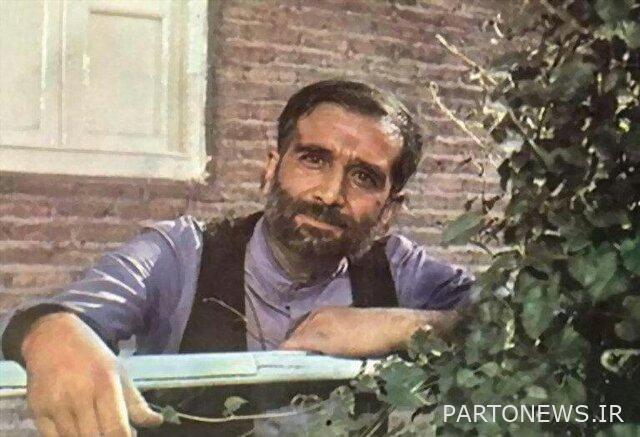A historic protest against “Mesh Qasim”

Although some people consider “Mesh Qasim” as Parviz Fenizadeh’s acting masterpiece, his first teacher, Hamid Saarigian, disagreed with this.
Charso Press: Today – March 5th – is the 43rd anniversary of the death of Parviz Fenizadeh, an actor who, despite his short life, shined in theater, cinema and television, and his early death hurt his fans as much as it hurt two directors who had experience working with him. Both annoyed and angry.
Parviz Fenizadeh, along with Saeed Poursamimi, Parviz Pourhosseini, was one of the first students of the Department of Dramatic Arts. He was soon discovered as a great talent in Iranian theater. Hamid Saarigian was his first teacher and the first collaboration between the two was in the play “The Unburied Dead” written by Jean-Paul Sartre. That one experience was enough for Mr. Moalem to realize the potential of his student, and this is how he considered the role of “Tom” for Fenizadeh in the performance of his next show, “Glass Zoo”. He also shone in this role and their next collaboration took place in the show “Mandatory Doctor”, a show that was noticed by critics and audiences and proved Fanizadeh’s talent in the comedy genre. As far as it has been said, it is impossible to imagine that any other actor but him will play this role. The same game prompted Bahram Beizai to invite Fanizadeh to play in the movie “Ragbar” and he was also featured in the role of Mr. Hekmati.
Playing a short role in the movie “Kasht and Aineh” directed by Ebrahim Golestan was his other role in the cinema.
Playing in the series “Uncle John Napoleon” directed by Nasser Taqvai, playing the role of “Mesh Qasim”, Fanizadeh captivated the television audience, to the extent that his famous quote “Dorge chera ta kabir aaa…” continues among different generations. It is exchanged.
In the following, we will review some parts of Hamid Saarigian’s comments about Fanizadeh’s abilities and his untimely death, which were published in the book “This is my home scene”:
“I have always said this and I am not exaggerating that an early death wronged one of Iran’s greatest acting talents. Fenizadeh died very soon. When he died, it was not the end. We have only seen a small percentage of his acting powers. Cell by cell, this man was an artist. I am sure that if he had, he would have discovered new roles in his old age. “When he died, I realized what Iranian theater has lost.”
“The lust of Fenizadeh’s game was the stage. He didn’t like cinema much and was mostly an actor with the presence of an audience. The presence of the audience and his breath freed Fanizadeh’s hidden forces, but the camera did not do that with him. Therefore, I always object to those who say that Fenyzadeh’s masterpiece Mesh Qasim is John Napoleon’s uncle, because Fenyzadeh was a stage actor because his forces were released in the presence of the audience. Of course, if he played more roles in the cinema, he would not lack anything, but his masterpieces were created on the stage and I saw this masterpiece in all the pieces I worked with him.

His power in acting ranged from comedy to tragedy. He was exceptionally strong for digesting complex and large plays because any theme could be conveyed to him quickly. Fenizadeh reads the role correctly in the first encounter with the play and before the director’s analysis. It was as if he was being inspired on how to read the role. Like people who are in the exceptional category and learn without a teacher and with their intelligence and instinct. He was such a person and he grew up without a teacher.”
“In one of our shows, after the performance, all the actors told him that Parviz, you played wonderfully tonight. He said because my loves were in the hall. He used to say his daughters; world and existence See how sensitive this creature is. “I always admired him for being so powerful with his small stature.”
About Fanizadeh’s early death, Sariyanyan said: “Any talent who leaves, it is not just the person who has gone, but his characteristic has gone.” When Fenizadeh died, it was as if Fenizadeh was stolen from us. The meaning of Fenizadeh was not only two eyes and ears, two hands and two legs, but also the power of Fenizadeh, who was buried.

He considered Fenizadeh’s acting to be at the level of top international actors and said: “Fenizadeh’s acting was at the level of international acting. He brings what the great players of the world took from their understanding of social culture and thinking to instinct, and he brings it right. As if he was inspired. The talent of acting in him was like the talent of poetry in someone who is a poet. »
It is said that Fenizade died due to tetanus. Apparently, he got injured in his leg and since he was acting in a movie at the same time, he got tetanus in the location of this movie, which was very dirty and even Naser Taqwai mentioned it as a barn, and he died due to this disease. , a subject that Taqwai spoke about with regret and anger years ago.
He passed away on March 5, 1958, when he had just turned 42 years old. This is the strange story of a man who was responsible for correcting information newspaper when he was young, but his love for acting led him to the Department of Dramatic Arts so that the art of our country could watch one of its purest talents.
///.

